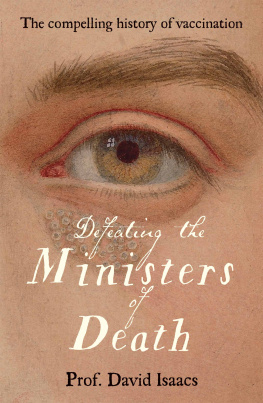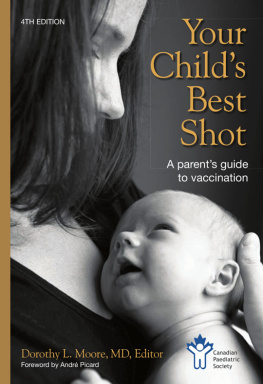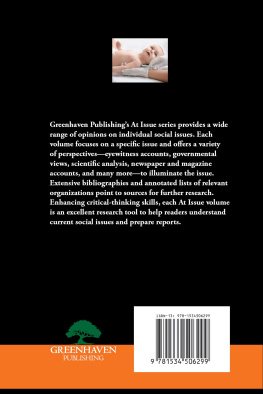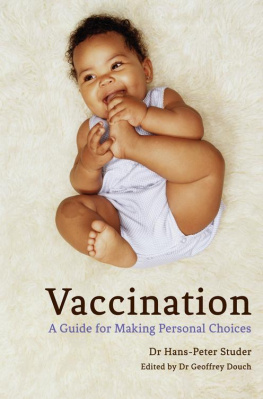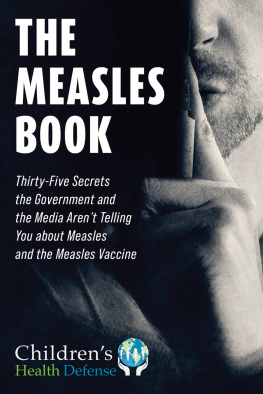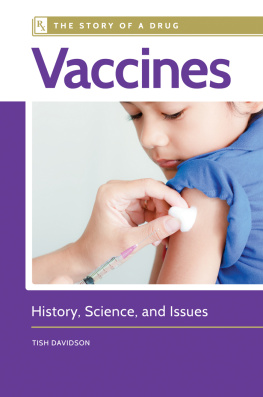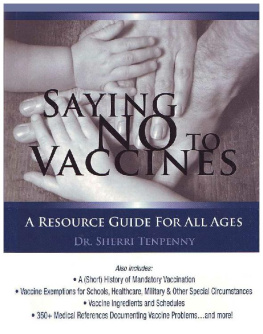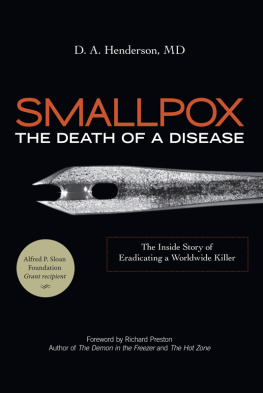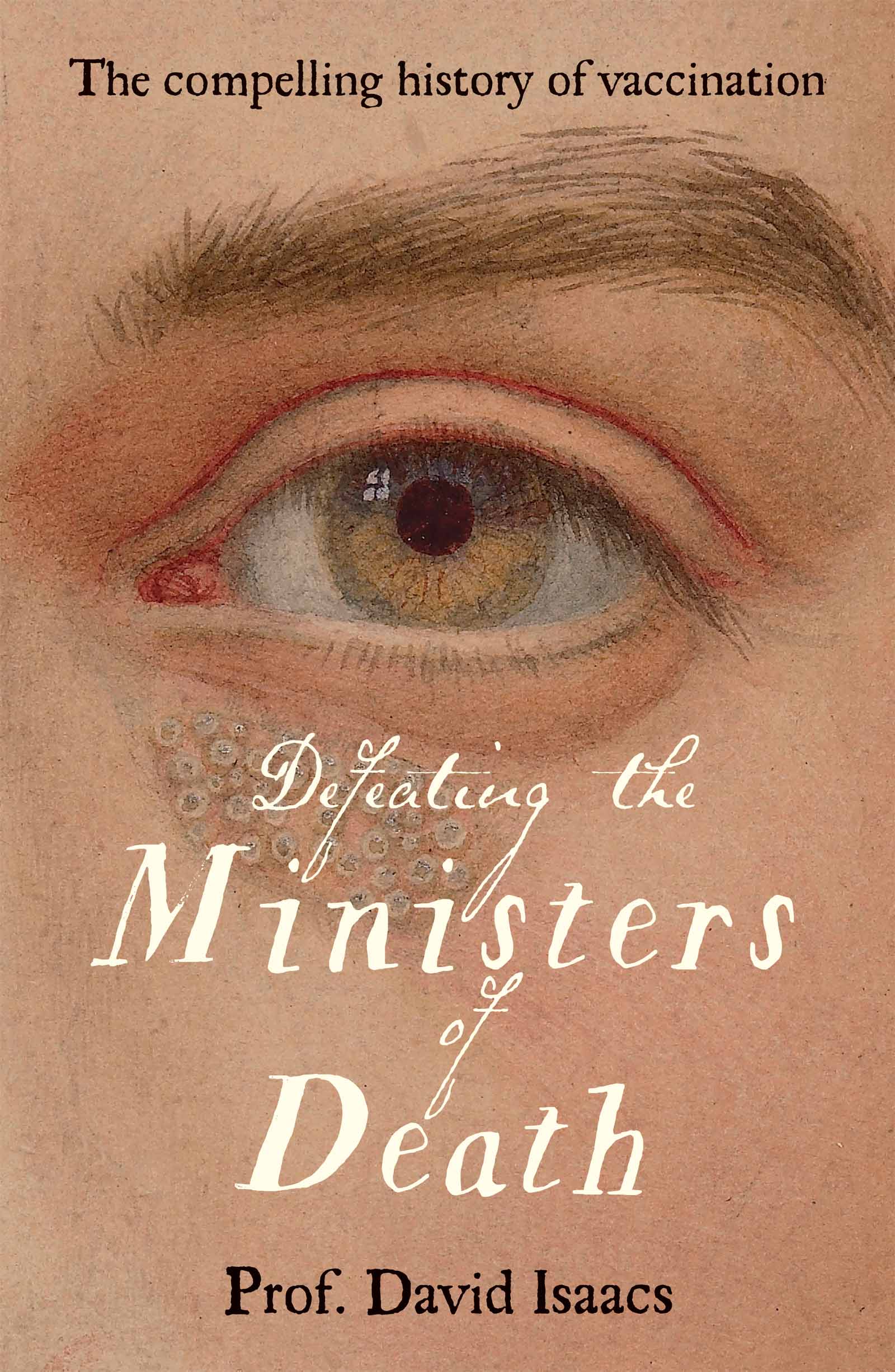Contents
Guide
To Carmel
Contents
Recently I met a young couple whose six-week-old son had just died from whooping cough (pertussis). They were devastated, but they were also angry.
Their son had been too young for immunisation, but had caught whooping cough from a school-age sibling. The older child had been immunised, but whooping cough had been circulating among unimmunised children at school.
Why had the other parents not had their children immunised? How could they have been so selfish? Shouldnt there be a law against it?
Immunisation is a topic that polarises opinion. As with climate change, people either tend to trust the experts or doubt them, and there is little room for a halfway position. Ethicists wring their hands: people claim rights, yet rights conflict. One parents right to decide whether or not their child is immunised can clash with another parents right for their child to be protected from other childrens infections.
There have always been opponents of immunisation. After immunisation was introduced at the beginning of the 19th century, there were large demonstrations in Britain and the United States. At one protest in Leicester, more than 80,000 people marched through the streets. The American opposition was also fierce, but more litigious.
Today, however, scientists can point to the remarkable successes achieved through immunisation. For centuries, smallpox was a devastating disease that killed many and permanently scarred survivors the English historian Lord Macaulay called it the most terrible of all the ministers of death. Even in 1950, the year I was born, an estimated 50 million people, about 2% of the worlds population, still caught smallpox each year, and as many as 10 million of them died from it. By 1978, however, smallpox had been eradicated by immunisation: a remarkable achievement that shows the extraordinary potential of immunisation to save lives. Today there is almost no one alive who has seen a case of smallpox.
Travelling in Africa or Asia, you will still see people crippled by polio. Yet polio too will soon disappear. In 1988, there were 350,000 cases worldwide; in 2017 there were just 29.
Of course there is much still to be done. In Africa, I have seen babies and children racked with spasms from tetanus. I have watched helpless as an African doctors 14-year-old son lapsed into a coma and died from rabies. I have seen hundreds of children die from meningococcal meningitis. I have seen wards of children with severe measles which, if they survived, left them weakened and vulnerable to dying from other infections such as severe gastroenteritis. Even in the United Kingdom and Australia, in years gone by, I saw children die or become brain-damaged from infections that have since all but disappeared due to immunisation programs.
The history of the development of vaccines by great scientists and doctors is one full of human interest, drama and magic. Of course, great scientists such as Louis Pasteur were flawed, like all humans, but that only adds to their intrigue. And this book aims to explore that human dimension: the people who developed the first vaccines; the children who were their first patients; those killed for trying to prevent polio. I will celebrate the successful control of many previously fatal infections, but also mourn those who died when early immunisation programs went wrong. And I will explore ethical issues, as well as the safety and effectiveness of vaccines.
People have written books about immunisation before. I wrote one in the year 2000 with the late lamented immunologist Gordon Ada called Vaccination: The Facts, the Fears, the Future. But in Defeating the Ministers of Death, my ambition is to inspire you by telling you the most exciting stories behind immunisation, and show you what these most human of stories have to teach us about ourselves.
The finely dressed crowd gathered in the White House was hushed. People were on tenterhooks and spoke in whispers. The orchestra too was silent; President Abraham Lincoln had forbidden any dancing.
Eleven years earlier, in 1851, the presidents second child, Eddie, had died aged three after a harrowing seven-week illness of coughing fits and fevers, probably diphtheria or tuberculosis. Now two of the Lincolns surviving sons, Willie and Tad, had caught typhoid, and lay weak with headaches, fevers, diarrhoea and severe aches and pains. Tad was recovering, but 11-year-old Willie was fading fast.
Mary Lincoln kept leaving the party, hurrying upstairs in her long white satin dress to be with her dying son. Marys seamstress, ex-slave Elizabeth Keckley, later wrote about Willies debilitating illness: The days dragged wearily by, and he grew weaker and more shadow-like. He was his mothers favourite child.
When Willie finally died on 20 February 1862, Abraham Lincoln could scarcely believe it. He walked down the corridor to the room of his secretary John Nicolay and sobbed: Well, Nicolay, my boy is gone he is actually gone!
Willies body was laid out in the White House on a huge rosewood bed, now called the Lincoln Bed. Elizabeth Keckley recorded the presidents words: My poor boy, he was too good for this earth. God has called him home. I know that he is much better off in heaven, but then we loved him so much. It is hard, hard to have him die! Then Lincoln buried his head in his hands and wept.
At the funeral, the Lincoln family gathered round the coffin to say farewell to Willie. Benjamin French, the funeral supervisor, wrote: While they were thus engaged there came one of the heaviest storms of rain and wind that has visited this city for years, and the terrible storm without seemed almost in unison with the storm of grief within.
Willies death rocked the Lincoln family to its core. For months afterwards, Abraham Lincoln would often retreat to a secluded room to weep. Mary was even more bereft. Elizabeth Keckley described her as an altered woman... she never crossed the threshold of the Guests Room in which he died, or the Green Room in which he was embalmed. Abraham had to hire a nurse to look after her.
Yet Mary Lincolns grief was only just beginning. One day in 1865, Abraham told Mary, We must both be more cheerful in the future. Between the war and the loss of our darling Willie we have been very miserable. They went to the theatre that same evening. Suddenly a well-known actor, John Wilkes Booth, burst into their private box and unaccountably shot Abraham Lincoln in the back of the head. Six years later, Tad died aged 18 from heart failure, possibly caused by tuberculosis.
Abraham Lincoln will be forever remembered, and rightly so, as the Great Emancipator who won the American Civil War and set his country on the path to the abolition of slavery. But his tragic family history illustrates the precariousness of childrens lives in that era. Only one of the Lincolns four children their eldest son Robert lived to adult life. Nowadays they would all have survived, thanks to a combination of vaccines, antibiotics and improved sanitation.
Under attack
Nature is the worlds greatest terrorist. While we may fear human terrorist attacks, in truth humans have always had far more to fear from infections.
In the fifth century BC, Athens and Sparta, the two most powerful city-states in Greece, became engaged in the bitter Peloponnesian War, which lasted 27 years. Athens lost the war, and this loss transformed ancient Greece, which became ravaged by vicious civil conflicts. Athens might well have won the war had it not been for a plague in 430 BC, the second year of the war, that killed over 30,000 Athenians, many of them previously healthy young men and women. The historian Thucydides caught the plague and survived, so his descriptions of the suffering are particularly poignant:

